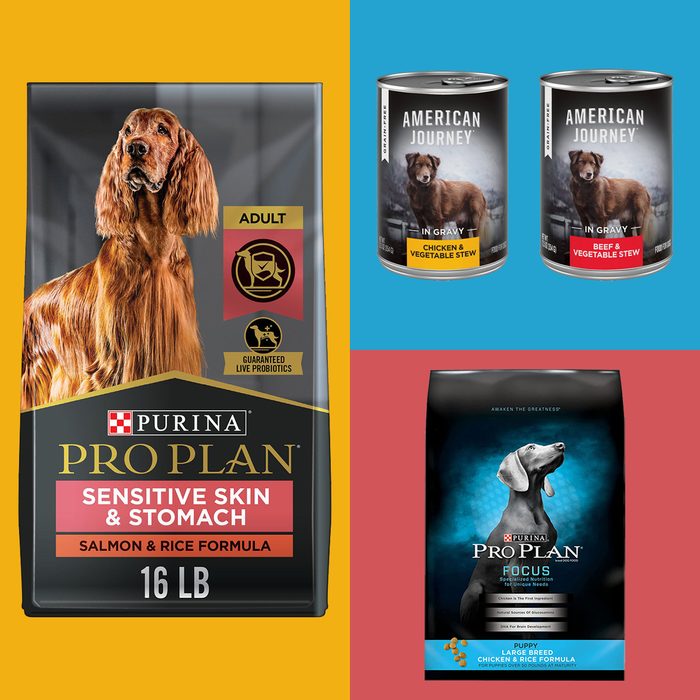
Different breeds, different needs
If you have a dog, you know that choosing the right food for them is essential. That’s why you might be looking for the best natural dog food or the best grain-free food (if recommended by your veterinarian) for your pet’s specific needs. But did you know that size also plays a big role when it comes to the best diet for your dog? Well, it does, which is why you want to be smart about choosing the best large-breed dog food if you have an oversized fur baby at home. Before we get into the specific vet-approved recommendations, there are a few things you need to know. (You can also get amazing offers on stuff for your furry best friend at the pet sale!)
What’s different about large-breed dog food?
It really boils down to calories in relation to your dog’s metabolism. “Smaller-breed dogs typically have a higher metabolic rate and actually burn more calories per pound,” explains veterinarian Joel Beth Navratik, DVM, former CEO of MRVL Pet Pharmaceuticals. “Large-breed puppies need to be calorie-restricted to prevent rapid weight gain.” This is especially important because studies show that if a large-breed puppy gains too much weight in his first year of life, he will be much more prone to arthritis in his later years. For that reason, large-breed dog food is usually crafted with fewer calories. It also tends to boast bigger pieces of kibble that help slow down a dog’s eating speed.
Should large dog breeds eat a grain-free or a BEG diet?
In case you aren’t familiar with the term, a BEG diet is one that consists of boutique, exotic and grain-free foods. When making this decision, it’s important to consult with your veterinarian before changing your dog’s diet to one that’s grain-free. The FDA also released a statement in 2023 about the investigation of the potential link between certain grain-free dog food and the canine heart disease called canine dilated cardiomyopathy (DCM). According to Lindsay Butzer, DVM, a small-animal veterinarian and PetMeds partner, “some grain-free diets may not provide the proper balance of nutrients your dog needs, which can lead to other health issues.” This can especially be true for larger dogs. “Large-breed dogs typically should not be fed a grain-free diet unless prescribed by their veterinarian,” Dr. Navratik explains.
What should you look for in large-breed dog food?
You should take several factors into consideration, including your dog’s age, breed, size and activity level. For instance, large-breed puppy foods should have a good amount of protein. “They should have 30% protein and 9% fat on a dry matter (DM) basis in addition to calcium amounts up to 1.5% and phosphorus around 0.8 to 1% DM,” explains Michelle Burch, DVM, a veterinarian with Safe Hounds Pet Insurance. “Large-breed puppy foods should also not be fed to a dog in all its life stages.”
For adult dogs, you’ll need a diet that provides a balanced ratio of fats, carbohydrates and proteins. “Pay close attention to the labels on dog food and look for foods labeled ‘complete and balanced,’ which is the best indicator that a food has all the necessary nutrients,” says George Melillo, DVM, Chief Veterinary Officer and co-founder of Heart + Paw. Beyond that, of course, you’ll want to take your dog’s special needs and preferences into consideration, as well as consult your vet. The expert-approved picks on this list will get you off to a good start and help your dog live a long, healthy life.
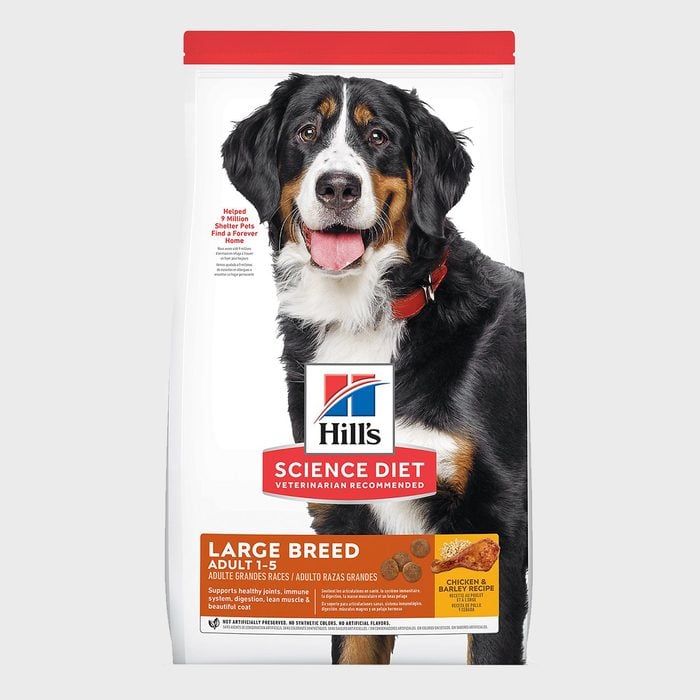 via chewy.com
via chewy.com
Best overall: Hill’s Science Diet
When it comes to an overall excellent choice, Dr. Navratik recommends Hill’s Science Diet Foods. In fact, it’s the brand she’s given her own pets over the years. “I have fed my dogs this food for the last 35 years, and my last three dogs have lived to over 17 years of age!” she notes. What’s in it? Good-for-them ingredients like real chicken, natural sources of glucosamine and chondroitin (which support healthy joints), antioxidants and vitamins, and omega-6 fatty acids. What’s not in it? Artificial colors, flavors and preservatives. This formulation is specially made for dogs over 55 pounds, including these giant dog breeds.
Highlights
- Available in dry and wet food
- Won’t cause stomachaches
- Great flavor options
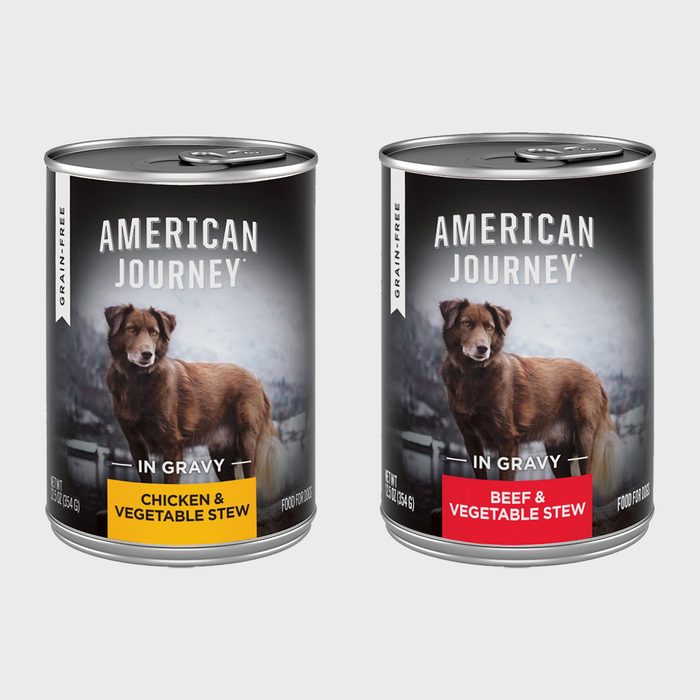 via chewy.com
via chewy.com
Best wet food: American Journey Grain-Free Stews
If your large dog has no history of heart issues and your vet gives it a go, consider these grain-free stews. When it comes to wet food, you should look for one with several sources of lean animal protein and real meat ingredients, such as beef, lamb and venison, says James Fuller, founder of the pet nutrition site HonestWhiskers.com. The best large-breed dog food options, he explains, “have higher protein content to ensure muscle maintenance, as well as development.” That’s why he recommends this American Journey formulation. “It also has whole-food ingredients that provide dense sources of vitamins, minerals and antioxidants,” he notes. “The organ meat significantly boosts vitamin A content too.” Combined, these qualities will give your pups tons of energy.
Highlights
- Good for picky eaters
- Whole-food ingredients
- Balanced formula
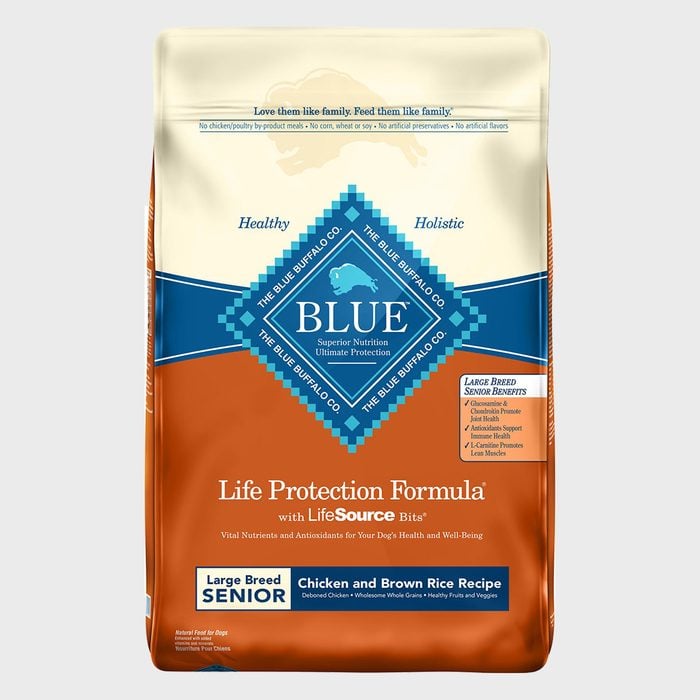 via chewy.com
via chewy.com
Best for seniors: Blue Buffalo Life Protection Formula
Aging may be a fact of life, but the right food can help your pet stay healthier in his golden years. “This food is rich in antioxidants, which helps senior dogs be more active,” Fuller explains. “The contents found in this dog food primarily promote muscle maintenance and immune health.” And that’s not all: It’s also packed with vitamin E, which helps prevent tissue damage associated with aging in dogs, as well as glucosamine, which wards off joint disease. That way, your furry BFF will be by your side for years to come. FYI, these dog breeds live the longest.
Highlights
- Antioxidant-rich ingredients
- Glucosamine and chondroitin for joint health
- Omega-3 and omega-6 fatty acids for healthy skin and coat
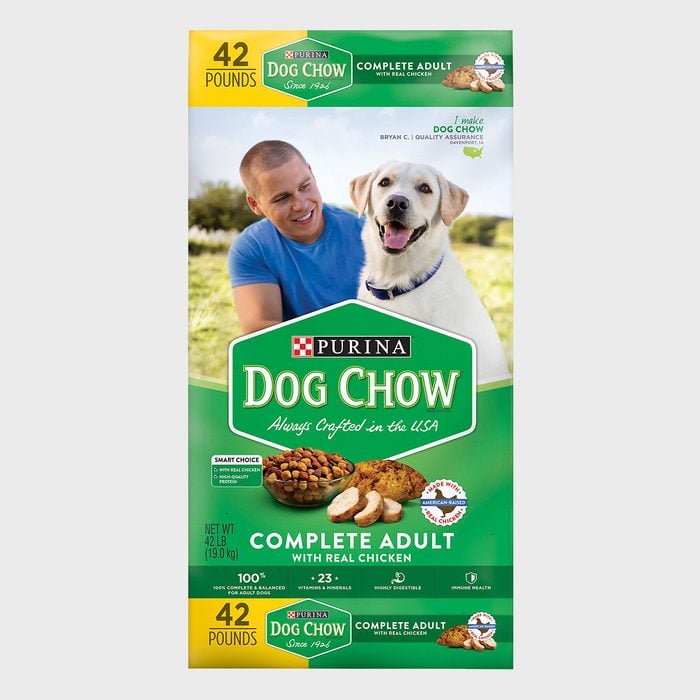 via chewy.com
via chewy.com
Best budget option: Purina Dog Chow Complete
You only want to give your pup the best, but it would be nice if the best didn’t break the bank. The good news: It doesn’t have to. According to Dr. Navratik, Purina Dog Chow is the way to go—and at just $24.99 for a 42-pound bag, we can totally see why. With real chicken and 23 vitamins and minerals, it provides adult dogs with a complete, balanced diet at just a fraction of the cost of other dry large-breed dog foods. Tempted to feed your pup some table food? These are the fruits and vegetables dogs can (and can’t) eat.
Highlights
- Wallet-friendly
- Contains 23 vitamins and minerals, including biotin
- Helps to clean your dog’s teeth
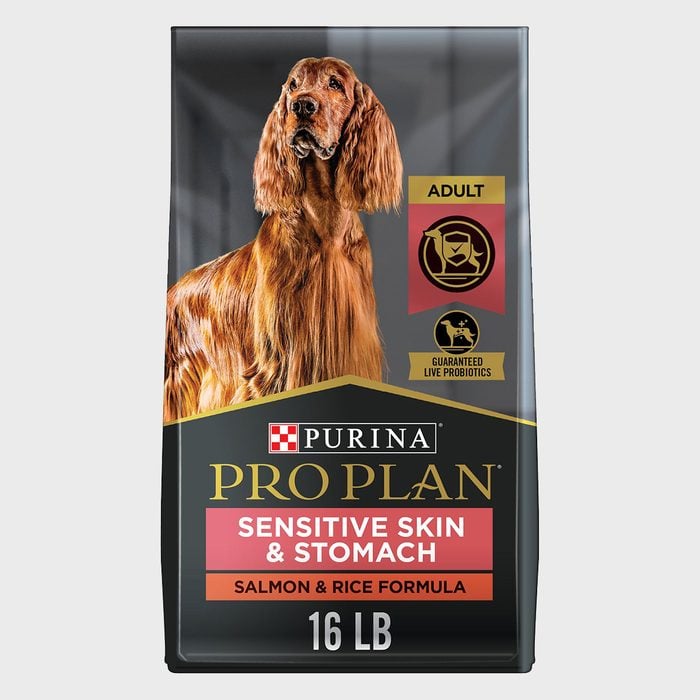 via chewy.com
via chewy.com
Best for stomach issues: Purina Pro Plan Sensitive Skin & Stomach
If your dog often experiences vomiting, diarrhea, bloating or constipation, switching to a large-breed dog food specifically formulated for sensitive stomachs can help. (Other signs of tummy issues include frequently licking their lips, gulping or a loss of appetite and energy.) For pets with these sorts of intestinal troubles, Dr. Burch recommends Purina Pro Plan Sensitive Skin and Stomach: “It has produced the best results of any over-the-counter brand I have used.”
It contains easily digestible ingredients—like salmon, rice and oatmeal—in addition to live probiotics and prebiotic fibers, which make digestion easier. How does it work? The omega-6s from the salmon decrease inflammation, and the prebiotics encourage healthy gut flora, Dr. Burch explains. Pro tip: Since dogs with sensitive stomachs often have sensitive skin too, bathing your pup regularly with the right dog shampoo can make them more comfortable.
Highlights
- Easily digestible
- Natural prebiotic fiber
- No artificial flavors
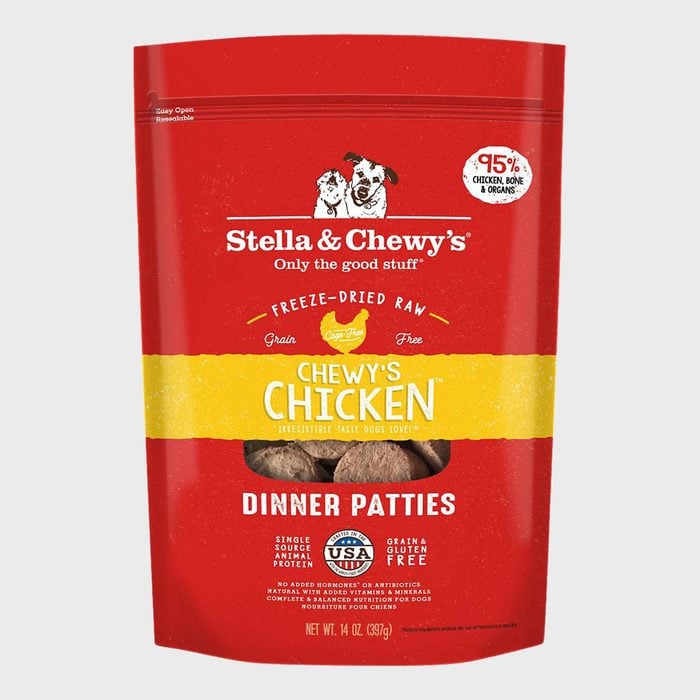 via chewy.com
via chewy.com
Best dehydrated food: Stella & Chewy’s Raw Food
Dehydrated dog foods like this one are formulated to mirror a dog’s ancestral diet, with 90% to 95% meat, organs and bone, and zero grains, says Dr. Navratik. It’s healthier for your pup because it contains fewer fillers and preservatives than other dog foods and is formulated specifically to complement your large dog’s biology. That said, it is fortified with added vitamins and minerals, enhanced with probiotics and antioxidants, and includes cage-free chicken. It’s also pea-free, lentil-free and potato-free, making it a smart choice for large dog breeds with food allergies or sensitivities (here are more picks for the best dog foods for allergies). If your dog isn’t eating and it’s not a medical issue, this dehydrated dog food might help.
Highlights
- Lots of choices
- Rich in vitamins
- Good for dogs with food sensitivities
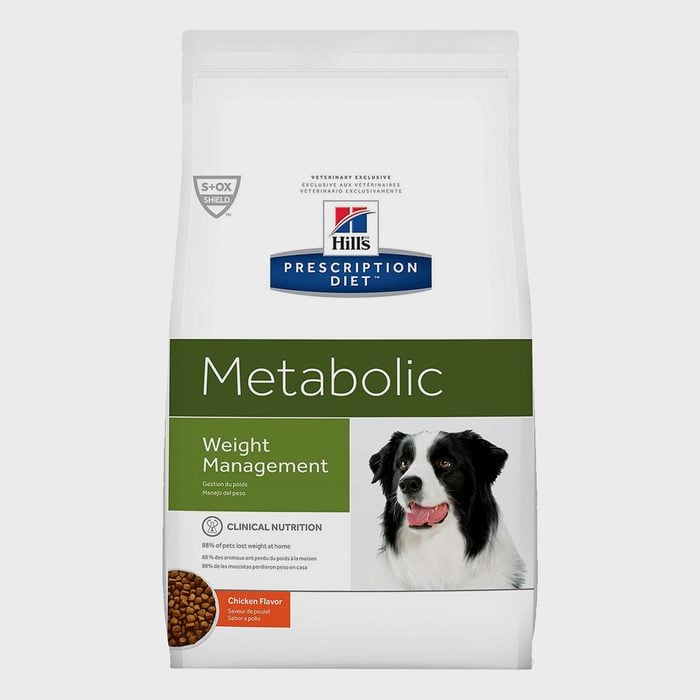 via chewy.com
via chewy.com
Best for weight control: Hill’s Prescription Diet Metabolic Dog Food
If your dog has put on a few extra pounds and you’re concerned about his health, Dr. Burch recommends changing his diet to one with fewer calories and an extra dose of fiber from fruits and veggies. This Hill’s Prescription Diet Metabolic formulation will do the trick. “It has a proprietary blend of fiber, which helps keep dogs feeling full and satisfied longer to prevent overeating,” she says, noting that the blend includes pea fiber, dried beet pulp, dried tomato pomace and flaxseed. “Its formula also helps to improve a dog’s ability to burn fat, which aids in weight loss.”
Highlights
- Helps manage weight
- Includes antioxidants
- Provides an energy boost
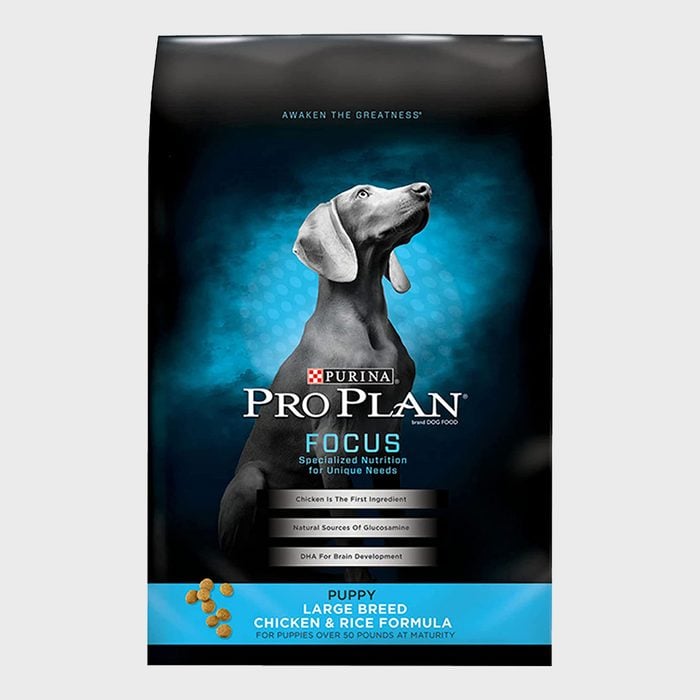 via amazon.com
via amazon.com
Best dry food: Purina Pro Plan Dry Dog Food
Dr. Melillo is a fan of this dry dog food—and not just because it helps your fur baby maintain a healthy weight. It also contains oatmeal, which is good for dogs with sensitive stomachs, and prebiotics to further promote digestive health. Beyond that, you’ll find sunflower oil, which is rich in omega-6 fatty acids for a shiny, healthy coat, and fish-oil-derived omega-3s. Purina Pro Plan also offers a number of protein and taste options for your pet, depending on his preference.
Highlights
- Made with omega-3 fatty acids
- Good for sensitive stomachs
- Nourishes the skin and coat
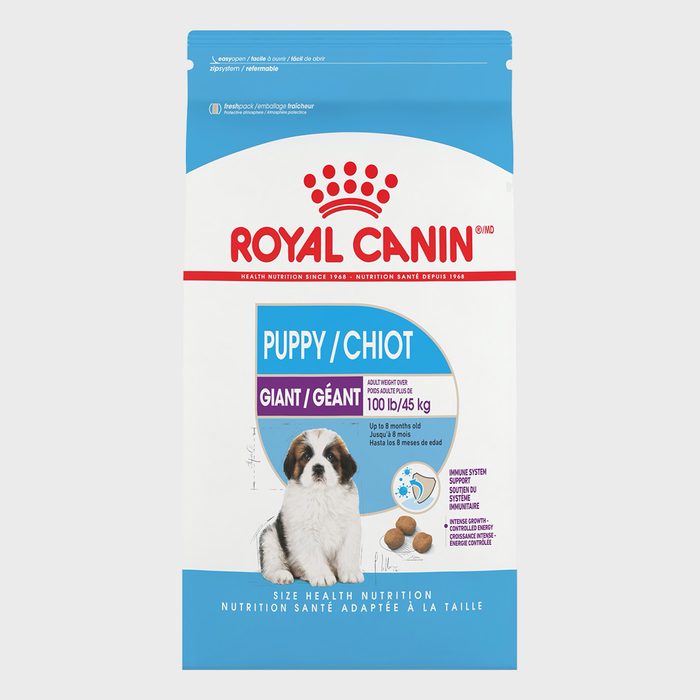 via petco.com
via petco.com
Best for puppies: Royal Canin Giant Puppy Dog Food
“Large-breed puppies require dog food that promotes steady growth,” says Fuller, noting that it’s essential for their overall health. “This is the best food for large-breed puppies because [it only has] 32% protein content, which prevents them from growing too quickly.” He also loves that the food has a healthy balance of fiber sources such as beet pulp, which supports sensitive digestive systems. So, exactly which big puppies is this right for? Those up to eight months old with an expected adult weight of over 100 pounds. Here’s what else you need to buy if you have a puppy.
Highlights
- Supports an intense growth rate
- Promotes good stool quality
- Includes ingredients that contribute to proper bone mineralization
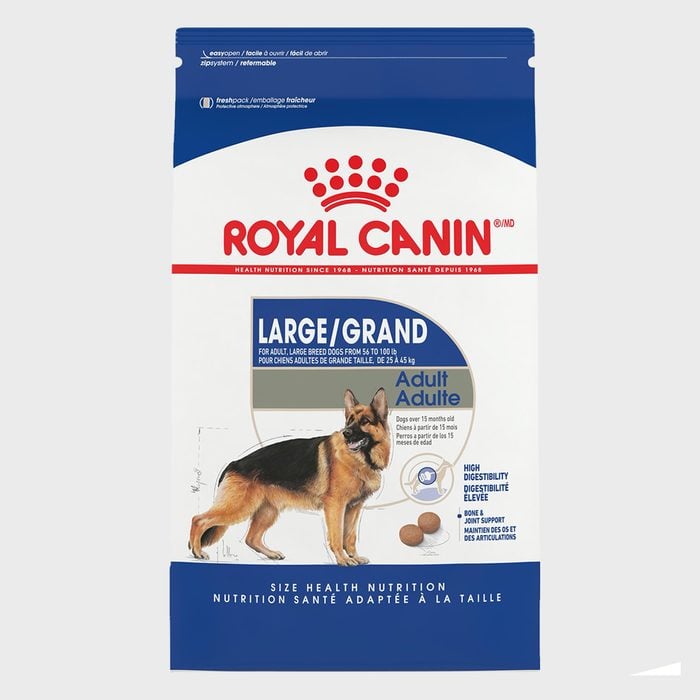 via petco.com
via petco.com
Best premium dry food for adult dogs: Royal Canin Large Adult Dog Food
Royal Canin is a quality brand, so when your large-breed puppy reaches adulthood at 15 months, you can graduate to this formulation. “I like it best because it’s formulated to be easily digested while supporting healthy bones and joints,” says Dr. Burch. “It also has added the fatty acids of EPA and DHA, which help promote healthy joints, skin and coat.” Depending on your dog’s energy level and weight, you can customize the portion size using Royal Canin’s feeding guide, which recommends feeding 75-pound dogs that are moderately active four cups per day. Speaking of maintaining your pup’s coat, you’ll want to bookmark these tips on how to groom your dog.
Highlights
- Quality protein and dietary fiber for good digestion
- Supports healthy bones and joints
- Satisfies a large dog’s appetite
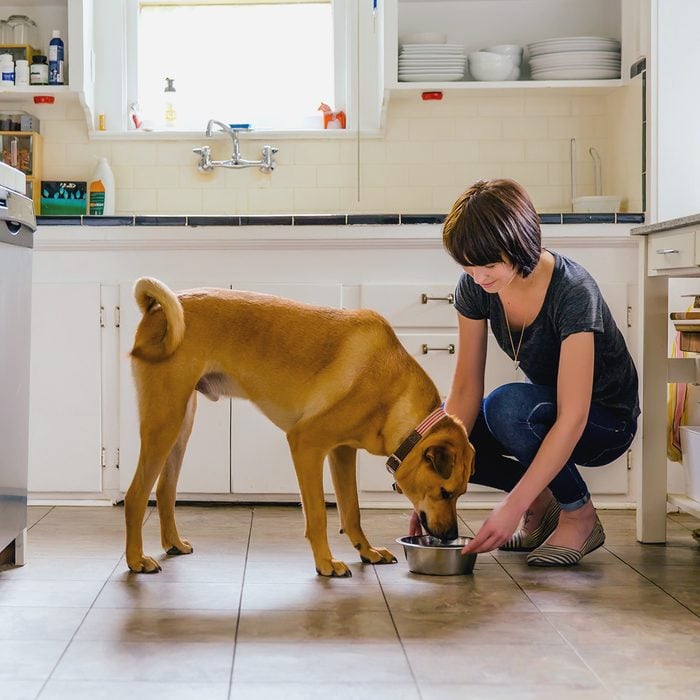 Inti St Clair/Getty Images
Inti St Clair/Getty Images
Best fresh food: BalanceIt.com and PetDiets.com Fresh Food Recipes
Want your dog to get as close to a natural diet as possible? Opt for fresh food. Dr. Burch likes using recipes from websites like BalanceIt.com and PetDiets.com, which, for a small fee per recipe, provide you with customized, vet- and nutritionist-approved recipes specifically formulated for your dog based on his age and breed. “Recipes from these sources will also ensure your pet’s diet meets all the necessary minerals, vitamins and nutrients needed for a healthy life,” she says, since most dog food recipes you’ll find online are not nutritionally balanced. (In fact, in an independent study of 200 homemade recipes for adult dogs conducted by the School of Veterinary Medicine at University of California in 2013, only 2.5% were nutritionally balanced.) On these sites, you can expect tailored recipes for large dog breeds that you can whip up at home, like meals made with beef, brown rice, peas and carrots.
Highlights
- Easy recipes
- Great for picky eaters
- Customizable
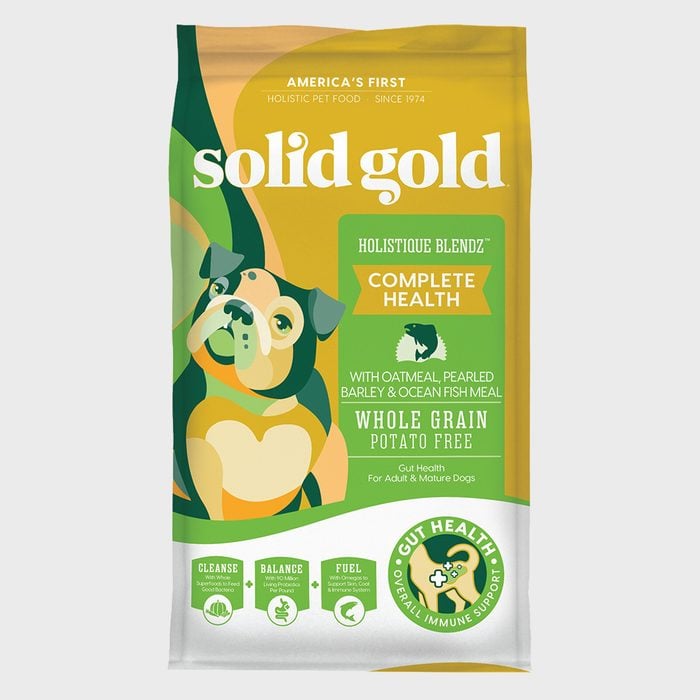 via solidgoldpet.com
via solidgoldpet.com
Best organic: Solid Gold Holistique Blendz Complete Health
As mentioned earlier, large-breed dogs typically should not be fed a grain-free diet unless prescribed by their veterinarian. That’s why Dr. Navratik recommends this organic dog food that’s packed with grains and superfoods like oatmeal, pearled barley and fish, which give your pup lasting fuel, promote gut health and provide overall immune support. An added bonus that sets this organic dog food apart: It contains 90 million probiotics per pound, which aid with digestion—for more, check out the best probiotic dog foods.
Highlights
- Includes superfoods
- Great for gut health
- Improves your pet’s immune system
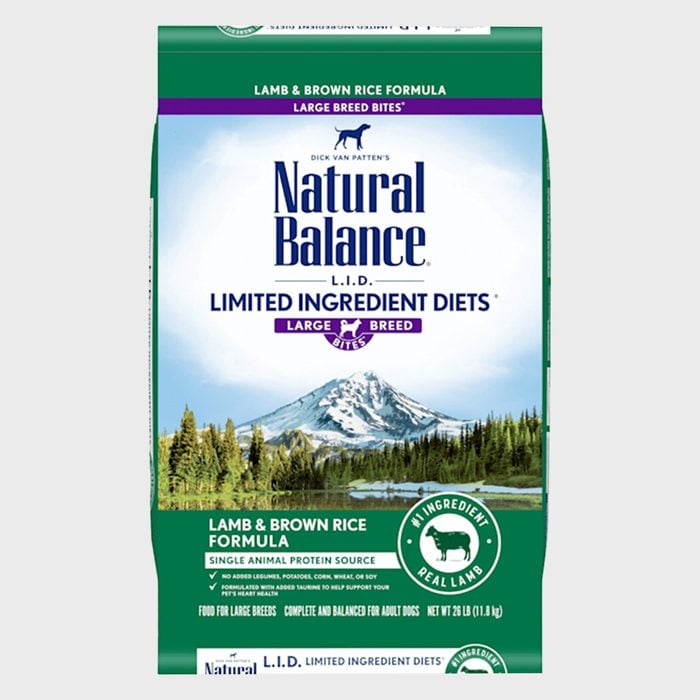 via petco.com
via petco.com
Best for allergies: Natural Balance Limited Ingredient Large Breed Dog Food
Common allergy signs in dogs include itchiness, hives, diarrhea or vomiting, sneezing, chronic ear infections, constant licking and itchy, watery eyes. If your pet has any of these symptoms regularly, your vet may recommend changing his diet. Fuller likes this Natural Balance formulation “because [while] it contains grains, it is gluten-free, helping with larger dogs’ energy and limiting common allergens.” And since it contains only one protein source (lamb) versus multiple protein sources, it limits the risk of new food allergies developing. An added perk: “The kibble is larger than that of other dog foods, [which promotes] proper chewing, while its rough texture assists with cleaning teeth,” Fuller explains.
Highlights
- Gluten-free
- Large kibble
- Helps clean your dog’s teeth
About the experts
- Joel Beth Navratik, DVM, is the former CEO of MRVL Pet Pharmaceuticals.
- Michelle Burch, DVM, is a veterinarian with Safe Hounds Pet Insurance.
- George Melillo, DVM, Chief Veterinary Officer and co-founder of Heart + Paw.
- Lindsay Butzer, DVM, is a small animal veterinarian and PetMeds partner.
Sources:
- FDA: “FDA Investigation into Potential Link between Certain Diets and Canine Dilated Cardiomyopathy”
- AKC: “Types of Dog Allergies and How to Treat Them”
- UC Davis: “Homemade dog food recipes can be risky business, study finds”
- FDA: “FDA Investigating Potential Connection Between Diet and Cases of Canine Heart Disease”
- James Fuller, founder of the pet nutrition site HonestWhiskers.com
